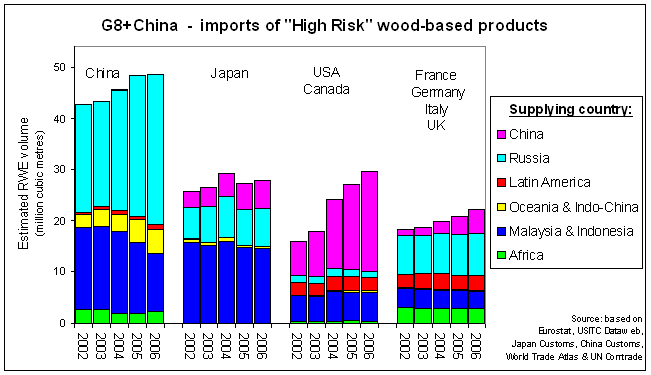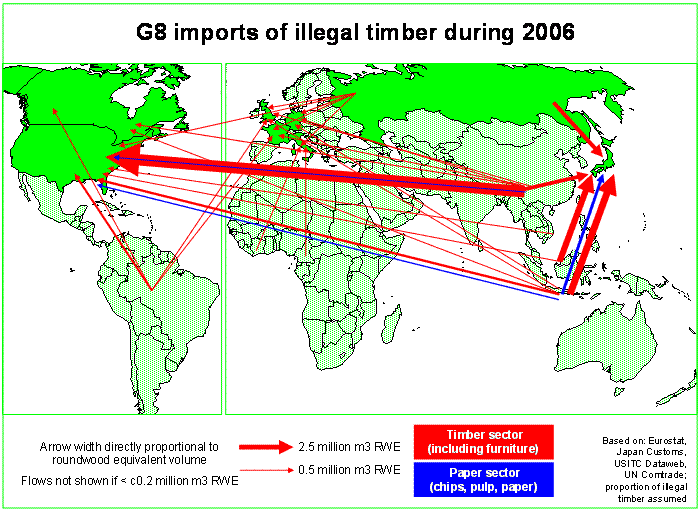|
|
||
|
|
||
|
G8 |
||
|
Note: This analysis for the upper and lower charts includes wooden furniture, pulp and paper as well as timber but excludes (i) Brazil's exports of softwood, and of pulpwood, pulp and paper and (ii) the estimated rubberwood content of products supplied from East Asia. It assumes that China's imports of waste paper are used primarily in the production of packaging for goods which are either exported or destined for end-use within China. As such, that packaging does not appear in statistics of China's paper exports.
|
||
|
China is included in this analysis partly because its economic impact on global affairs (and particularly Climate Change) is for various reasons rather greater than that of most countries of the G8 and partly in order to place these G8 imports into perspective relative to those of China. A G8 which excludes China implicitly perpetuates the view that the old "world order" remains intact and that China remains insignificant. The wood-based product imports of the four G8 countries of the EU and Japan appear to have been unaffected by such efforts during the last five years. In contrast, the imports of the USA (and China) have risen so strongly that even if the proportion of Illegal Timber in those imports had declined quite significantly (which is most unlikely), the Illegal Timber imports of the USA (and China) would nevertheless have increased. This approach to analysis of the global response to illegal logging and related trade is potent, simple, and (if confined to import value using the UN Comtrade database) very quick. High Risk countries are here defined as countries whose exports of wood-based products are widely believed to be at risk from contamination by Illegal Timber. Such Illegal Timber includes wood-based products processed in mills which seem to have been fraudulently financed (notably in the Paper Sectors of China and Indonesia), from forests access to which has been improperly obtained and/or which are not being logged in accordance with credible managament plans. The upper chart clearly indicates that China accounts for the great majority of the growth in imports from High Risk countries (/ the Illegal Timber imports) of the USA (and to a lesser extent the four EU countries - Canada's imports are largely insignificant to this analysis). The apparent reduction in China's imports from Indonesia and Malaysia is difficult to explain. However, it is perhaps primarily attributable to the success of efforts to reduce illegal trade (from Papua and from Indonesia via Malaysia). As the chart illustrates, China appears have responded by incresing its imports from countries with even poorer records of forest sector governance. Illegal Timber
per se Roughly 40% of trade in illegal timber is attributable to G8 imports. Japan and the USA are responsible respectively for a half and one quarter of those G8 imports. Much of this illegal timber is imported as logs (mainly Japan), sawn wood, plywood, furniture, and flooring. Five countries, Brazil, China, Indonesia, Malaysia and Russia appear to supply (but not necessarily all from their own forests) the great majority of the illegal timber which the G8 imports. The G8 (directly and indirectly) imports a significant share of the illegal timber which these five countries export. Until effective efforts by consumer countries to combat those imports, perhaps on a product basis (e.g. flooring, furniture, plywood), producer countries and processing countries are unlikely to act against illegal timber (other than by diluting their own laws). The G8 also imports a significant share of the illegal timber which is exported from Central and West Africa - but (as with Russia) the EU (and in some instances, China) imports more than the G8 does from these regions. G8 member country Russia supplies approximately 20% of world trade in illegal timber, mainly from its eastern regions. China imports about one quarter (and exports almost 10%) of world trade in illegal timber. The chart above assumes proportions of illegal timber which vary according to supplier and importer, and which are generally lower than those estmated for China's illegal timber imports. Unless the G8 is seen to be greatly reducing its own imports of illegal timber (including from China), its initiatives against illegal logging will not be credible (and a consequent reduction in G8 illegal exports will be unlikely). Further, given that high level corruption is a root cause of illegal logging and trade in illegal timber, action effectively to curtail such corruption (across the extractive industries) and particularly money laundering (London is said to be the money laundering centre of choice in northern Europe) should, together with the prohibition of illegal timber imports, be primary G8 initiatives. By, in effect, condoning trade in illegal timber, the G8 is facilitating not only the demise of its own timber manufacturing industry but also the expansion of China's economy. The consequences of this include increased global competition for raw materials (leading to higher prices, poor govenance and political violence in impoverished producer countries - negating G8 "development"-related initiatives, particularly in Africa), increased militarisation and, in China, unsustainable patterns of consumption and industrialisation (leading to climate change). Thus, importing timber (and other goods) from China - and investing in export-oriented manufacturing in China - may save G8 consumers money in the short term but prove expensive in the longer term. Unfortnately, governance in G8 countries seems to focus more on creating perceptions of (short term) prosperity than sustainable development - and in fostering free trade that is neither fair nor legal. |
||
|
Copyright
globaltimber.org.uk
|


